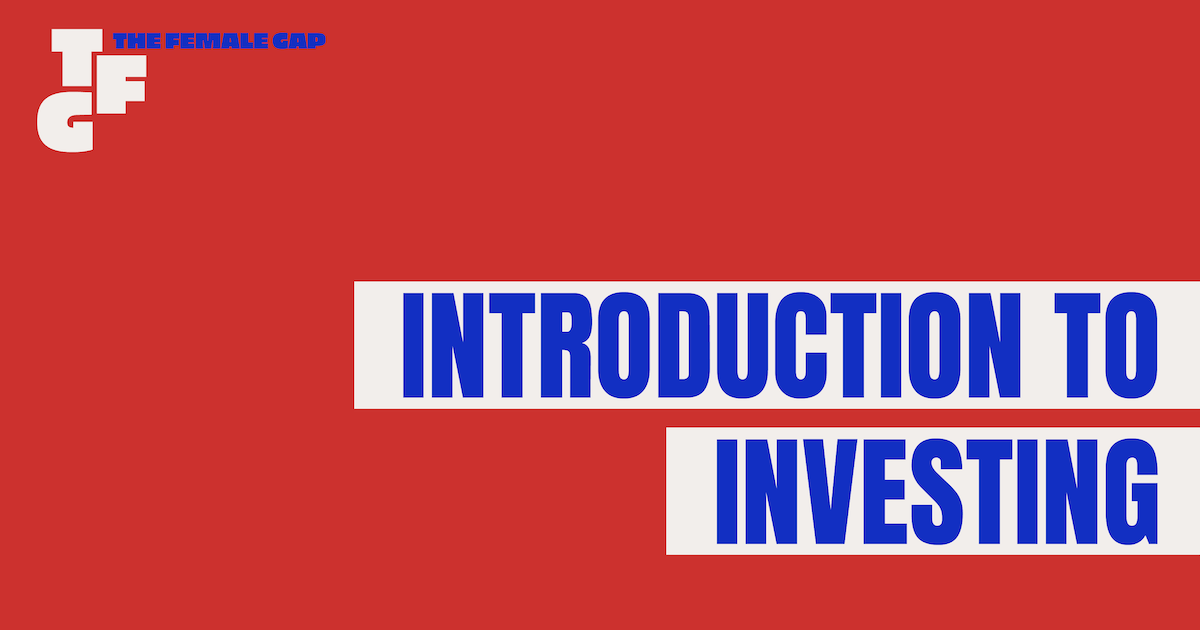- The Female Gap
- Posts
- Making Money While Pretending to Adult
Making Money While Pretending to Adult

Hi ladies and gents,
December, last month of 2023, which means 2024 is around the corner. Another opportunity for “new year, new me” quotes. I hope this year you also added “gain more financial knowledge and start caring about my money” to your list of new year’s resolutions. And that is where The Female Gap steps in.
So for the entire month of December, I have decided that we’ll dive into one topic only and make a series out of it - investing.
We’ll make it clearer for you than your ex’s mixed signals.
Introduction to investing
Closing the Gap - Emma Grede
Book of the month - Intelligent Investor by Benjamin Graham - part I
LET’S COVER THE BASICS
Introduction to Investing
This series will be split in 4 parts:
Introduction to Investing - today’s edition
Let’s start with the most important question. Why is investing important?
As mentioned many times before, getting where you want in life takes time and money and investing is one of the ways to grow that wallet of yours. And we also learned in the past that money = power.
Next question. What is investing?
Investing in the simplest terms is putting your money towards an asset with the expectation to later sell it at a higher price. That can be a house/apartment, gold, artwork, designer bag, vintage bottle of wine, maybe a prestigious car or the most common asset when we talk about investing - a stock1.
When you invest into a stock you essentially buy a piece of the company. Stocks represent ownership and can also give you the voting power on important decisions of the company. And if you manage to get a big enough share of the company, you might be able to get in with the boys (because most shareholders are men unfortunately) and change some things around.
I mentioned shares. Is there a difference between a stock and a share you might ask? There is, but they basically mean the same thing. Stock tells you which company you are investing in, and a share tells you how much of that stock you own.

The price of the stock. What determines the price of a stock is like everything else - supply and demand on the market. If the demand for a specific stock increases, the price will go up.
And how exactly do I make money from stocks? Glad you asked.
There are two main ways.
The price of the stock that you bought goes up and you sell it at a higher price than you bought it for, because you made profit.
Historical data shows that over the long term, the average annual stock market return is around 8%.
Let’s dissect this sentence a little bit because it is very important.
historical data - past performance is no guarantee for future results. This means that like everything else in life (except for death and taxes - we’ll talk about those in the future) nothing is guaranteed.
over the long term - earning money with investing is like a marathon. You need to be ready to run the long haul. Think 5 years or more.
average annual return - some years the market goes up (+15%), some years the market goes down (-7%) and you need to keep that in mind. When you are in it for the long run, this will all even out. So don’t panic when you see red numbers.
Another way of earning with investing is through dividends2. It is an amount of company’s profit that is paid out per share. So the more shares you have, more dividends you get. Usually how it works is that the price of the stock decreases by the same amount as the dividends that are paid out.
So if price of the stock was 5$ and the payout of dividends is 0.5$ per stock, the price of the stock will be 4.5$ after the dividends will be paid out. If you had 100 shares, your payout will be 50$. Most often they get paid out quarterly.
Not all of the companies pay out dividends though. That is decided by the company’s management on yearly basis and it usually depends on how well the company has performed that year.
Can I buy a stock of whatever company I want? The answer would be no. Only publicly traded companies are the ones that have issued stocks in the process of IPO3 or initial public offering. Companies do that to raise new money to fund growth, expansion and other initiatives. This is the simple explanation of IPO. We’ll dive into this topic in one of later editions of newsletter.
Now the final question. Where do you buy stocks?

No, you won’t have to go elbow your way to a stock like you see in the movies.
The IPOs mentioned before? After the IPO the stock gets listed on a stock exchanges4 . They are the marketplaces where the selling and buying of the stocks and other financial instruments is happening. That is done by traders/brokers, not by you and me. Where you’ll go and buy some stock is the trading platform5. That is an online platform where you my fellow investress will buy your first stock.
But more on that in the next edition.
It’s not that complicated as you thought right?
So stay tuned for more investing info coming your way next week.
Until then invest your time wisely and watch an episode or two of GG.

GLOSSARY
1 Stock - a share in the ownership of a company. A claim on the company's assets and earnings.
2 dividends - the distribution of a company's earnings to its shareholders that is determined by the company's board of directors. Dividends are often distributed quarterly and may be paid out as cash or in the form of reinvestment in additional stock.
3 IPO - initial public offering is when a private company first sells shares of stock to the public. An IPO means that a company's ownership is transitioning from private ownership to public ownership.
4 stock exchanges - it acts as a market where stock buyers connect with stock sellers. Stocks can be traded on several exchanges such as the New York Stock Exchange (NYSE), Nasdaq, London stock exchange etc.
5 trading platform - software systems used to execute and manage market positions. Essentially, trading platforms enable investors and traders to place trades and monitor their accounts.
CLOSING THE GAP
Emma Grede
Besides having a really great sense of fashion, Emma is a true powerhouse. Check her insta #lifegoals

Emma is the CEO of Good American, the size-inclusive fashion brand she cofounded with Khloe Kardashian, founding partner, chief product officer of Kim Kardashian's shapewear brands Skims*, co-founder of Safely, a brand of plant-based cleaning and self-care products and a chairwoman of the Fifteen Percent Pledge, an initiative that encourages retailers to shift 15% of their shelf space to Black owned brands.
*Fun fact - apparently Skims is thinking of doing an IPO.
With an estimated net worth of over $300 million dollars, Grede has 8% company stake in Skims, 23% stake in Good American, and 22% stake in Safely.
Wow! And to think that her first job was delivering newspapers in East London.
Another little lesson - company stake that Emma has does not mean that she owns stocks of these companies, because none of them are public ones. This simply means that she has an ownership share of a regular private company.
Besides that she is a wife and a mother of 4 kids. She is doing it all girls.
BOOK OF THE MONTH
The Intelligent Investor
by Benjamin Graham
I already know that this book will not fit into 4 upcoming newsletters that I have planned for December, but I’ll do my best. If I won’t manage, I’ll add the remaining info in the book review that I’ll be sending out on the 1st of January 2024!
Yes, we ain’t skipping it and you’ll have it on hand for a later time. When the hangover lays off.
Let’s start.
First a bit about the book. The first iteration of the book was written back in 1950. Since than it has been updated and rewritten a couple of times, but the basic principles are still applicable today.
Warren Buffet (one of the most successful investor of our time) has quoted it many times and says till this day, that it’s still the best book he read on investing. And if he says it, it must be true.
He also wrote a preface and I liked one paragraph so much, that I want to put it here word by word:
To invest successfully over a lifetime does not require a stratospheric IQ, unusual business insights or inside information.
What’s needed is a sound intellectual framework for making decisions and the ability to keep emotions from corroding that framework. This book precisely and clearly prescribes the proper framework. You must supply the emotional discipline.
Similar to the book of past month, he points out that investing and other money related skills are way more related to psychology than intellect or even math skills. I think that is very important because I know women often think, that they do not know enough to handle their finances. And that is something I want to change with this newsletter as well.
What makes an Intelligent Investor?
The Intelligent Investor is a realist who sells to optimists and buys from pessimists.
The market always swings between two sides - unsustainable optimism (which makes stocks too expensive and more risky) and unjustified pessimism (which makes them too cheap ans less risky). The higher the price you will pay, the lower your return will be. Graham says, as Buffet pointed out, that the secret to your financial success is inside yourself.
“In the end, how your investments behave is much less important than how you behave. For indeed , the investor’s chief problem - and even his worst enemy - is likely to be himself.
You need to be patient, disciplined and eager to learn. You must be able to harness your emotions and think for yourself, which is a trait more of the character than of the brain.”
He makes a point to differentiate between an investor and a speculator. He says that an investment is an operation, which upon analysis, promises safety of the principal and an adequate return. Operations not meeting these requirements is a speculation.
There are two types of investors according to him. The defensive (passive) and the enterprising (active). Defensive strives towards avoidance of serious mistakes or loses. He does not want to put in too much effort and avoid making frequent decisions. The enterprising investor is prepared to devote time and care to the selection of stocks that are more attractive than the average ones.
I must warn you - it is not a short and easy read, but I still highly recommend it. Let me know if you manage to get to end of it and send me your thoughts 🙂
SOME NEWS
If you want to know more about Emma Grede, she was a guest on a recent Jay Shetty podcast. Great listen for an afternoon walk.
Last week we spoke about how important it is to find your why, when making financial plans. This might help you out.
Lately I have been often thinking about how grateful I am for my life. And by doing that it has made my happier. You can do it too.
Reply